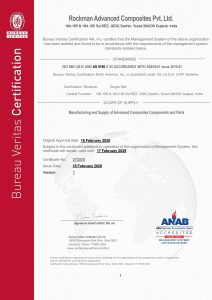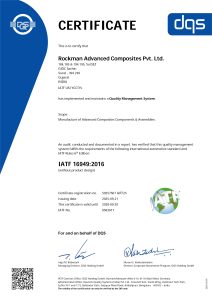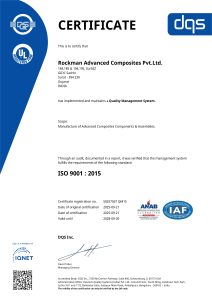Composites stand out as a phenomenon of innovation in the field of materials science and engineering. Made of two or more distinct constituents, composites are highly versatile materials that are revolutionising industries from automotive to aerospace and from construction to sports. Composite materials have emerged as a cornerstone of innovation in the modern industrial domain because of their ability to combine lightweight properties with exceptional strength and durability. Composites have a unique ability to combine the best properties of their components and minimize their weaknesses which make them valuable in modern applications. Behind this massive transformation lies the hands of top and pioneering composite manufacturing companies that are playing a significant role in driving progress with cutting-edge technologies and sustainable practices.
Why Composites Matter?
Composite materials are made by combining two or more constituents of different physical or chemical properties like polymer or ceramic to provide superior properties compared to their individual components. The resulting composite materials possess superior characteristics such as being lightweight, strong, corrosion-resistant, and versatile that is hard to find in a single component. With industries keenly focusing on performance, sustainability, and efficiency there is an increase in the demand for composites. Top composite manufacturing companies are efficiently catering to this growing need and are also investing in research and development to innovate and excel in this material engineering field. The two prime components of composites are the matrix and fiber, in which the matrix is the base material and the fiber reinforces the material. Besides these, composites may also include fillers, additive, surface, and surface finishes providing unmatched performance.
Composites Hold an Edge over Other Materials
Composite manufacturing companies are playing a pivotal role in allowing industries to achieve breakthroughs in design, performance, and sustainability. Composites allow industries to take advantage of the matrix’s compressive strength and the tensile strength of the embedded fibers. Both these materials depend on each other, as fiber provides strength and matrix provides structure, as fiber cannot maintain its shape. Thus, when fibers and matrix are combined they form a composite material of great strength in terms of compression and tension. With industries demanding efficient and environmentally friendly solutions, top composite manufacturing companies are ensuring a future where sustainability and innovation go hand in hand. These composite manufacturing companies are playing a vital role in driving the industry forward and shaping a better world for posterity.
Different Types of Composites Produced by Top Manufacturing Companies
Composites are classified based on the diverse types of matrix material:
Polymer Matrix Composites – Polymer Matrix Composites are made using polymers like epoxy, polyester, or thermoplastics as the matrix and reinforcements like glass, carbon, or aramid fibers to enhance the mechanical properties of the composites. This composite is commonly used in aerospace, automotive, and sports industries.
Metal Matrix Composites – Metal composites are made with metals like aluminium or titanium that serve as the matrix that is reinforced with ceramic or carbon fibers. This type of composite is known for its high strength and resistance to wear and is used in high-temperature environments like engines.
Ceramic Matrix Composites – in this composite, ceramic matrix is reinforced with ceramic or carbon fibers to provide exceptional thermal stability. This composite is ideal for applications in gas turbines and space exploration.
Advantages of Composites
Composites manufactured by the top-most companies are high in demand across multiple industries due to their unparalleled advantages such as:
Lightweight – Composites are extremely light in weight and offer a high strength-to-weight ratio. Thus, this material is ideal for use in the aerospace and automotive industries to reduce the weight of the vehicle and enhance fuel efficiency.
High Strength and Durability – Composites are known for high strength and durability, as reinforcements enhance the material’s strength while matrices ensure long-term durability.
Corrosion Resistance – Composites particularly polymer composites are known to withstand harsh weather conditions and chemicals. Hence these composites are known for their corrosion-resistant features making them ideal for application in the construction industry.
Design Flexibility – Composites are known for their design flexibility feature that allows this material to be moulded into complex shapes and designs. Besides, these materials can be designed for specific properties and can be made to be strong in a specific direction, offering unmatched design versatility.
Composites Fuelling Innovation across Industries
Driven by advancements in material science and manufacturing technologies, composite manufacturing companies are emerging as innovators shaping the future of material science. The top composite manufacturers are making great use of technologies and innovation to leave a lasting impact on diverse industries. From creating energy-efficient wind turbines for renewable industry to reducing the weight of electric vehicles in the automotive sector, their efforts are visible in multiple sectors. These manufacturers are driving growth in the composite market by adopting advancements in recycling technologies, sustainable practices, and smart composites. Emerging trends in the material science and manufacturing field include integrating sensors and actuators into composites that lead to precise monitoring of structural health. Besides, researchers are making an effort to create bio-based and recyclable composites to address environmental issues. With industries across the globe striving for efficiency, sustainability, and performance, composite manufacturing companies will play a vital role.
Final Thoughts
Composites are experiencing a paradigm shift in the field of materials engineering. These materials offer unparalleled advantages across diverse industries. With the combined strengths of different materials, these composites are leading to once-unimaginable innovations. The unrelenting pace of research and development ensures that composites will remain at the forefront of modern engineering and will create a profound and enduring impact on industries like aerospace, automotive, and healthcare. In the coming years composite manufacturers will emerge as true game-changers in the materials world.








